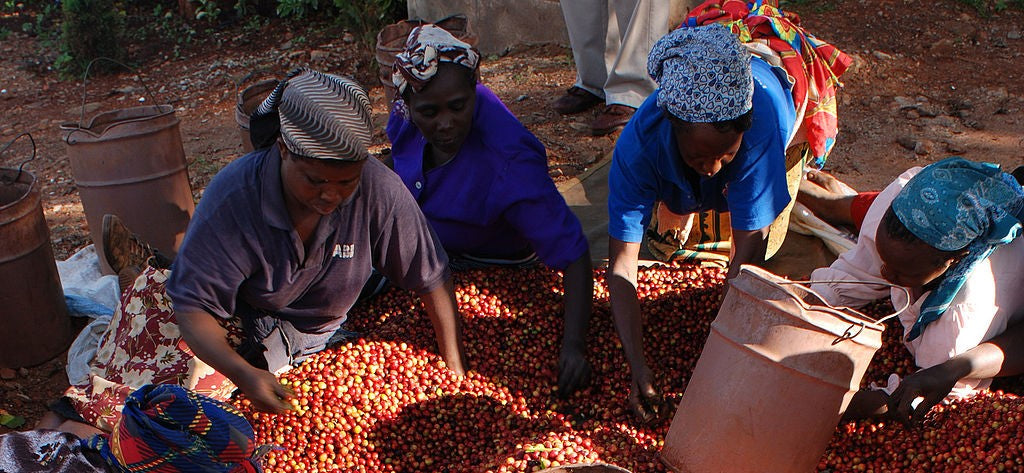Your Cart is Empty

Today, Kenya is one of the most well-known coffee-producing nations, with plenty of high-altitude zones and wonderfully rich volcanic soils. But despite being so naturally suited for coffee and so close to the Ethiopian plateau, where coffee evolved, Kenyans did not drink or grow coffee until the early twentieth century.
Coffee was not a part of Indigenous Kenyan societies; it was introduced by European colonists in 1893, as the British were consolidating control of the region. Kenya was a British colony from 1895 to 1963, and the colonial government restricted coffee growing to only white colonists. Following independence, the domestic coffee industry survived political instability and took off, with some 6 million Kenyans growing the crop today.
Kenyan coffees are renowned within the coffee world for their exceptional quality and unique, acidic flavor profiles. Taste some at Harbinger today—perhaps while you take in this brief but fascinating history of coffee in Kenya.

In 1885, European powers met in Berlin to divide Africa among themselves, with no regard for the cultures and people who lived there. In 1895, the British declared Kenya part of its “East African Protectorate,” despite it being the homelands of the Kikuyu, Embu, Meru and Kamba people, among others.
Coffee, meanwhile, was just taking off as a popular beverage in neighboring Ethiopia. Despite being a native plant there, coffee was for centuries regarded as too hedonistic for most of Ethiopia’s Christian population. By the 1880s, however, even the Ethiopian emperor was imbibing, and coffee had already been established as a cash crop by European powers elsewhere.
After European missionaries brought coffee to Kenya in 1893, British authorities only allowed white colonists to cultivate the plant, forcing native Kenyans to labor on coffee farms. By the 1910s, coffee was the colony’s number-one export, with large coffee plantations covering hundreds of acres around Nairobi.
The Kenyan Coffee Board was established in 1933, and the colonial government hired agricultural scientists to develop outstanding hybrid varieties. Today, Kenyan coffees are renowned for their distinct flavor profiles and high quality, and these prized characteristics can be traced back to the early British investment in crop science. While some native Kenyans could eventually grow their own coffee under British rule, colonial law made it so that colonists and their large plantations controlled the industry.

Access to the coffee industry was a major grievance among native Kenyans who resisted British rule. As early as 1920, groups like the Young Kikuyu Association included rights to grow coffee alongside demands for Kenyan representation in the colonial government. World War II disrupted momentum for independence, but starting in the 1950s, the violent resistance of a group known as the “Mau Mau” threw British Kenya into upheaval for more than a decade. During this time, the colonial government enacted policies to try and pacify the population, including the Swynnerton Plan, an agricultural reform that allowed more Africans to grow coffee.
The Mau Mau resistance led to Kenya finally gaining independence in 1963, and a truly Kenyan coffee industry began to take shape. Although ethnic tensions continued to plague the new Kenyan government, coffee would quickly emerge as one of the linchpins of the national economy, which grew by about 8 percent annually in the decade following independence. The country’s first president, Jomo Kenyatta, enacted the Coffee Development Authority, which broke up the powerful colonial coffee estates and established a patchwork of smaller farms and cooperatives. By the early 1980s, coffee accounted for 40 percent of all Kenyan exports.

In the late 1970s and 1980s, political infighting, corruption, and economic mismanagement brought Kenya back into the gravity of Western financial investment. With Kenya’s economy successfully privatized in the 1990s, foreign investment took over the coffee industry, especially the crucial chokepoints of exporting and roasting.
Today, there are some 700,000 small coffee farms in Kenya who must sell to around 570 cooperatives, which in turn work with only a handful of millers, who sell to only a few dozen exporters, including Nestlé and Kraft. Milling and export companies leverage their powerful positions in the supply chain to take the lion’s share of the profits, while it has become harder for a coffee farmer to break even in Kenya than it is in nearly any other coffee-producing country.
The result of this uneven consolidation is that many Kenyan farmers have opted to sell their land instead of trying to make it in the coffee industry, even as Kenyan coffee continues to fetch high prices in the international market and demand continues to increase. As of 2023, the Kenyan government has enacted reforms aimed at correcting this imbalance, allowing farmers more options to get a better price. Although Kenya is now an independent nation, the struggle for its coffee producers to profit in an industry dominated by Western interests very much reflects the country’s colonial past.

Harbinger’s commitment to quality means that we only source the best coffees from the most capable farmers. We work with several importers chosen for their decades of experience in coffee and who ensure farmers are paid what they deserve. Stop by Harbinger today and sample one of our Kenyan roasts, or order a bag and have it delivered in northern Colorado.
Sources for this post:
http://www.xinhuanet.com/english/africa/2021-07/06/c_1310044505.htm
https://christopherferan.com/2021/12/25/kenya-and-the-decline-of-the-worlds-greatest-coffee/
https://www.flickr.com/photos/icraf/32609123162/in/photostream/